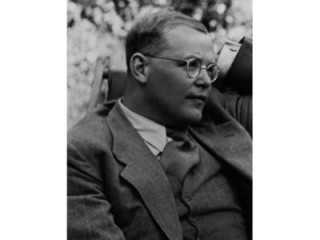
Dietrich Bonhoeffer biography
Date of birth : 1906-02-04
Date of death : 1945-04-09
Birthplace : Breslau, Germany
Nationality : German
Category : Famous Figures
Last modified : 2011-02-18
Credited as : Theologian, and marthyr,
The German theologian Dietrich Bonhoeffer had a major influence on post-World War II Protestant theology. Executed because of his part in the German resistance to Hitler, through his actions and writings he called for Christian involvement in the world.
Dietrich Bonhoeffer was born on Feb. 4, 1906, in Breslau, the sixth of eight children. His father was a leading professor of neurology and psychiatry; his mother was the granddaughter of a distinguished church historian. When Dietrich was 6, his family moved to Berlin. He was educated at the universities of Tübingen (1923-1924) and Berlin, where he was awarded a doctorate in 1927 at the age of only 21.
Bonhoeffer's doctoral dissertation, The Communion of Saints (1930), introduces some of his most characteristic emphases: a passionate concern that Christianity be a concrete reality within the real world of men; a wholly Christ-centered approach to theology, grounded entirely in the New Testament; and an intense preoccupation with the Church as "Christ existing as community."
After a year as curate of a German-speaking congregation in Barcelona, Spain (1928-1929), Bonhoeffer spent the academic year 1930-1931 in the United States as Sloane fellow at Union Theological Seminary. In fall 1931 he became a lecturer in theology at Berlin University, and his inaugural dissertation was published that year as Act and Being. Two collections of his lectures were later published: Creation and Fall (1937), an interpretation of chapters 1-3 of Genesis; and Christ the Center, published posthumously from student notes. The latter work foreshadows the central idea of his last writings—Christ's whole being is His being-for-man, and His powerlessness and humiliation for man's sake are the fullest disclosure of the power and majesty of God.
Bonhoeffer was one of the first German Protestants to see the demonic implications of Nazism. After Hitler came to power in 1933, Bonhoeffer helped organize the Pastors' Emergency League, which became the nucleus of the Confessing Church of anti-Nazi German Protestants. While serving as minister to a German-speaking congregation in London (1933-1935), he sought support from international Christian leaders for the German Christians who were protesting Nazism.
In 1935 Bonhoeffer returned to Germany and founded a clandestine seminary to train pastors for the illegal anti-Nazi church. The seminary, located chiefly at Finkenwalde, continued despite Gestapo harassment until 1937. Bonhoeffer organized the seminary as a living workshop in Christian community and developed close relationships with his students. Out of Finkenwalde came The Cost of Discipleship (1937), a clarion call to active obedience to Christ based on the Sermon on the Mount, and Life Together (1939), a brief study of the nature of Christian community.
As war became increasingly inevitable, friends arranged an American lecture tour for Bonhoeffer with the hope that he would remain in the United States indefinitely. But only 6 weeks after his arrival in New York, he decided to return to Germany to suffer with his people.
Bonhoeffer became a member of the German resistance movement, convinced after much soul searching that only by working for Germany's defeat could he help save his country. From 1940 to 1943 Bonhoeffer worked on a study of Christian ethics, which was grounded in the biblical Christ as the concrete unity between God and the world. The sections he completed were later published as Ethics (1949).
In January 1943 Bonhoeffer became engaged to Maria von Wedemeyer, a longtime acquaintance. In April, however, he was arrested; while incarcerated he wrote the correspondence that later appeared as Letters and Papers from Prison (1951). In these fragmentary but highly original writings he developed his earlier ideas into a highly positive evaluation of modern secular thought and life, and a strongly negative judgment on traditional religiosity. Bonhoeffer described modern secularization as the world's "coming of age" from earlier religious and metaphysical dependencies into autonomous ways of understanding and coping with life. In such a world "religion"—as individualistic, otherworldly piety and dependence upon God as a "supreme being"—is dying out. Bonhoeffer believed that a Christian should not be narrowly "religious" but should be fully involved in the world. His own participation as a Christian in the momentous political struggle of his time embodies this "secular style" of discipleship.
After the abortive attempt on Hitler's life by the resistance (July 20, 1944), evidence came to light that incriminated Bonhoeffer, and he was hanged at Flossenbürg on April 9, 1945.
















